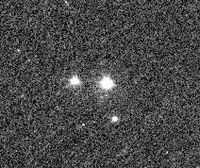3C 147
| 3C 147 | |
|---|---|
|
Hubble Legacy Archive WFPC2 image of 3C 147 | |
| Observation data (Epoch J2000) | |
| Constellation | Auriga |
| Right ascension | 05h 42m 36.138s[1] |
| Declination | +49° 51′ 07.23″[1] |
| Redshift | 0.545[1][2] |
| Distance |
5.1 billion light-years (Light travel time)[2] 6.4 billion light-years (present)[2] |
| Type |
Quasar[3] Core-Dominated[2] Seyfert 1[1][2] |
| Apparent magnitude (V) | 17.8[1][2] |
| Other designations | |
| PGC 2355407, 2E 1506, 2MASS J05423614+4951071, QSO B0538+498[1] | |
| See also: Quasar, List of quasars | |
3C 147 (B0538+498) is a compact steep-spectrum (CSS) quasar[3] that was discovered in 1964. It is located in the constellation Auriga not far in the sky from the 5th magnitude star Omicron Aurigae.
The "distance" of a far away galaxy depends on what distance measurement you use. With a redshift of 0.545,[1][2] light from this active galaxy is estimated to have taken around 5.1 billion years to reach us.[2] But as a result of the expansion of the Universe, the present (co-moving) distance to this galaxy is about 6.4 billion light-years (1974 Mpc).[2]
Very Long Baseline Array (VLBA) observations have identified a complex central region that is dominated by two bright components, A and B.[3] The separation between the two central components of the source seems to be increasing with an apparent velocity (superluminal motion) of 1.2 ± 0.4 c.[3]
References
- ↑ 1.0 1.1 1.2 1.3 1.4 1.5 1.6 "3C 147". SIMBAD Astronomical Database. Retrieved 2010-04-21.
- ↑ 2.0 2.1 2.2 2.3 2.4 2.5 2.6 2.7 2.8 "NASA/IPAC Extragalactic Database". Results for 3C 147. Retrieved 2010-04-21.
- ↑ 3.0 3.1 3.2 3.3 Rossetti, A.; Mantovani; Dallacasa; Junor; Salter; Saikia (2009). "VLBA polarimetric observations of the CSS quasar 3C 147". Astronomy & Astrophysics 504 (3): 741–749. arXiv:0910.2146. Bibcode:2009A&A...504..741R. doi:10.1051/0004-6361/200811190.
External links
- Wikisky image of 3C 147 (PGC 2355407)
